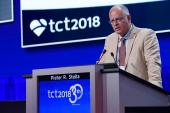Polymer-Free Stent Noninferior to ZES at 3 Years: ReCre8
Full data beyond this landmark analysis will be needed for the study’s clinical implications to be clear, said Robert Byrne.

Three-year findings of the investigator-initiated ReCre8 trial confirm continued noninferiority of a new, polymer-free, amphilimus-eluting stent compared with a market-approved, permanent-polymer zotarolimus-eluting stent (ZES) with regard to target lesion failure in unselected patients.
Original findings, published in Circulation in 2018, showed similar rates of TLF at 12 months in an all-comers population randomized to either the polymer-free Cre8 stent (Alvimedica) or the Resolute Integrity ZES (Medtronic). Dual antiplatelet therapy was given for 12 months in troponin positive patients and for 1 month in those who were troponin negative.
Michiel Voskuil, MD, PhD (University Medical Center Utrecht, the Netherlands), who presented the 1- to 3-year landmark analysis last weekend during the virtual CRT 2021 meeting, noted there was also no late catch-up phenomenon observed with the study stent.
Robert A. Byrne, MB BCh, PhD (Mater Private Hospital, Dublin, Ireland), who commented on the new findings for TCTMD, said “the comparable results between both stent groups are reassuring for the polymer-free stent because all other things being equal, a stent that doesn't have any polymer might have an advantage in the long term. Whether or not you can prove that over 5 and 10 years of follow-up remains to be seen, but the general argument holds.”
Additionally, the broad inclusion criteria of the study, its modest size, and the fact that it was investigator-initiated are notable advantages, he said. “It's important that we have studies like this which are conducted in a relatively pragmatic manner.”
The current findings show similar rates of the primary endpoint of TLF among the 1,491 European patients randomized to the control and study stents in a landmark analysis between 1 and 3 years (4.9% vs 5.1%; P for noninferiority = 0.0031). There were also no differences observed in the individual endpoints of cardiac death (1.5% vs 1.9%; P = 0.57), target-vessel MI (0.8% vs 1.1%; P = 0.61), and TLR (3.2% vs 3.1%; P = 0.84). One patient implanted with ZES reported stent thrombosis with none observed in the Cre8 group.
The findings were upheld in various subgroups stratified by troponin status, diabetes, lesion type, age, and sex.
Overall Data Needed
The fact that Voskuil only presented the landmark analysis raised a flag for Byrne, as this suggests there may have been substantial loss to follow-up. The full 3-year data will be important to see before considering any implications, he said.
Additionally, the study was powered to test noninferiority at only 1 year, so Byrne urged caution regarding this conclusion at 3 years. “You can say there are comparable results in both groups,” he said. “Maybe I'm splitting hairs here, but you can't go and retest noninferiority. That's something that's generally not a good idea from the principles of clinical trial conduct.”
Nonetheless, said Byrne, “we're not seeing a plateauing off of events after 1 or 2 years and that kind of strengthens the argument for people who say we still need this breakthrough technology, be it scaffolds or be it drug coated balloons, that leave nothing behind. So, in some respects, the results strengthen that argument when you see ongoing accrual of events with no evidence of a plateau effect.”
The potential benefits of a polymer-free stent are most attractive for certain patient groups like those with diabetes because the amphilimus formulation may be more apt to be “preferentially taken up by diabetic cells,” he explained, adding that he would like to see more data on this population specifically
Yael L. Maxwell is Senior Medical Journalist for TCTMD and Section Editor of TCTMD's Fellows Forum. She served as the inaugural…
Read Full BioSources
Voskuil M. Three-year clinical outcomes after implantation of a permanent polymer zotarolimus-eluting stent versus a polymerfree amphilimus-eluting stent: landmark analysis of the ReCre8 trial. Presented at: CRT 2021. March 13, 2021.
Disclosures
- Voskuil and Byrne reports no relevant conflicts of interest.



Comments